Recent Faculty Books

Outsiders at Home
The Politics of American Islamophobia
By Nazita Lajevardi
Discrimination against Muslim Americans has soared over the last two decades with hostility growing especially acute since 2016 - in no small part due to targeted attacks by policymakers and media. Outsiders at Home offers the first systematic, empirically driven examination of status of Muslim Americans in US democracy, evaluating the topic from a variety of perspectives. To what extent do Muslim Americans face discrimination by legislators, the media, and the general public? What trends do we see over time, and how have conditions shifted? What, if anything, can be done to reverse course? How do Muslim Americans view their position, and what are the psychic and sociopolitical tolls? Answering each of these questions, Nazita Lajevardi shows that the rampant, mostly negative discussion of Muslims in media and national discourse has yielded devastating political and social consequences.https://www.cambridge.org/core/books/outsiders-at-home/9B6C61DDC2158E36229F3E57BF5F8352

The Conscientious Justice
How Supreme Court Justices' Personalities Influence the Law, the High Court, and the Constitution
By Dr. Ryan C. Black
United States Supreme Court justices make decisions that have a profound impact on American society. Empirical legal scholars have portrayed justices as either single-minded or strategic seekers of policy, and there is little room in these theories for things like law, reputation, or personality. This book offers a fresh perspective that will jar Supreme Court scholarship out of complacency. It argues that justices' personalities influence their behavior, which in turn influences legal development and the United States Constitution. This impressive group of authors exhaustively examine every part of the Court's decision-making process, and focus on the trait of conscientiousness and how it influences justices over nine different empirical contexts, from agenda setting to writing the Court's opinions. The Conscientious Justice is an important and comprehensive account of judging that restructures existing approaches to analyzing the High Court.
https://www.cambridge.org/core/books/conscientious-justice/contents/20E72EDD13A0BA64D450A7118FC648D6
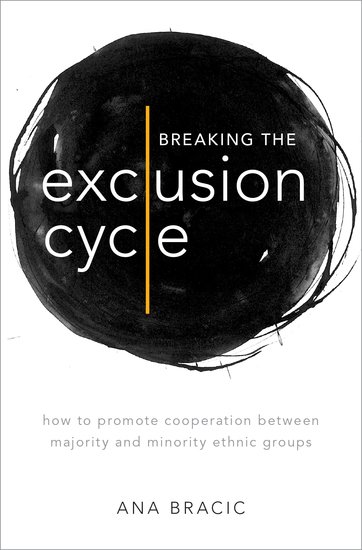
Breaking the Exclusion Cycle: How to Promote Cooperation between Majority and Minority Ethnic Groups
By Dr. Ana Bracic
Social exclusion of minority groups is an intractable problem in many diverse nations. For some minority groups this means going to segregated schools, for others not having access to gainful employment or quality healthcare. But why does social exclusion persist, and what can one do to stop it?
This book proposes a theory of how individual behavior contributes to social exclusion, a novel method for measuring that behavior, and solutions to ending it. Based on original fieldwork among Central and Eastern European Roma, the largest ethnic minority in Europe (yet still very understudied), and non-Roma, Ana Bracic develops a theory she calls the exclusion cycle, through which anti-minority culture gives rise to discrimination by members of the majority, and minority members develop survival strategies. Members of the majority resent these strategies, assuming that they are endemic to the minority group rather than an outcome of their own discriminatory behavior.
To preorder the book, go to https://global.oup.com/academic/product/breaking-the-exclusion-cycle-9780190050672?cc=us&lang=en&#

Democracies and Authoritarian Regimes
By Dr. Erica Frantz
Dr. Erica Frantz, Assistant Professor of Political Science, has published her latest book covering the full spectrum of political systems. "Democracies and Authoritarian Regimes" was written with Andrea Kendall-Taylor and Natasha Lindstaedt and published through Oxford University Press.
Oxford describes the book as "the only introduction to cover the full spectrum of political systems, from democracy to dictatorship and the growing number of systems that fall between, equipping readers to think critically about democracy's future trajectory."
This is Dr. Frantz's seventh book. For more information on this and her other publications, go to her website: https://sites.google.com/view/EricaFrantz/books?authuser=0
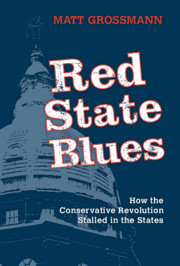
Red State Blues: How the Conservative Revolution Stalled in the Senate
By Dr. Matt Grossmann
The political divide between Democrats and Republicans seems to be the most contentious in recent years but in his latest book, “Red State Blues,” Michigan State University political scientist Matthew Grossmann presents findings that might put some liberals at ease.
As Republicans gained more power and control in Congress over the last 25 years, democratic lawmakers and constituents alike thought that the right-wing policies would be enacted and have an adverse effect on the nation’s economy, environment, social issues and foreign policy.
In “Red State Blues,” Grossmann discusses what he found after closely tracking how the Republican resurgence influenced policy and socioeconomic outcomes across all 50 states. What he found was that while Republicans have successfully maintained power, they have not substantially altered the nature or reach of government.
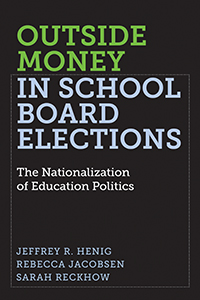
Outside Money in School Board Elections: The Nationalization of Education Politics
By Dr. Sarah Reckhow
Outside Money in School Board Elections documents and analyzes the injection of external funding into local elections. Local school board contests have recently become flashpoints of national donor interest. Some observers see this engagement as a needed boost for complacent school districts while others view it as a threat to local democracy.
Drawing on a detailed study of elections in five districts (Bridgeport, Connecticut, Denver, Indianapolis, Los Angeles, and New Orleans), the authors explore what happens when national issues percolate downward into local politics. They suggest that the involvement of wealthy individuals and national organizations in local school board elections are signs of the nationalization of local education politics that potentially have significant implications for equity and democracy.
Outside Money in School Board Elections brings attention back to local participation and the diversity of players at that level, and highlights the national trend of increasing wealth inequality and its impact on the politics of education. This cross-case investigation demonstrates that local and national education politics are not separate fields but closely intertwined areas of political advocacy with complex interactions.

Authoritarianism: What Everyone Needs to Know
By Dr. Erica Frantz
Despite the spread of democratization following the Cold War's end, all signs indicate that we are living through an era of resurgent authoritarianism. Around 40 percent of the world's people live under some form of authoritarian rule, and authoritarian regimes govern about a third of the world's countries.
In Authoritarianism: What Everyone Needs to Know®, Erica Frantz guides us through today's authoritarian wave, explaining how it came to be and what its features are. She also looks at authoritarians themselves, focusing in particular on the techniques they use to take power, the strategies they use to survive, and how they fall. Understanding how politics works in authoritarian regimes and recognizing the factors that either give rise to them or trigger their downfall is ever-more important given current global trends, and this book paves the ways for such an understanding.
An essential primer on the topic, Authoritarianism provides a clear and penetrating overview of one of the most important-and worrying-developments in contemporary world politics.

How Dictatorships Work
By Dr. Erica Frantz
This accessible volume shines a light on how autocracy really works by providing basic facts about how post-World War II dictatorships achieve, retain, and lose power. The authors present an evidence-based portrait of key features of the authoritarian landscape with newly collected data about 200 dictatorial regimes. They examine the central political processes that shape the policy choices of dictatorships and how they compel reaction from policy makers in the rest of the world. Importantly, this book explains how some dictators concentrate great power in their own hands at the expense of other members of the dictatorial elite. Dictators who can monopolize decision making in their countries cause much of the erratic, warlike behavior that disturbs the rest of the world. By providing a picture of the central processes common to dictatorships, this book puts the experience of specific countries in perspective, leading to an informed understanding of events and the likely outcome of foreign responses to autocracies.
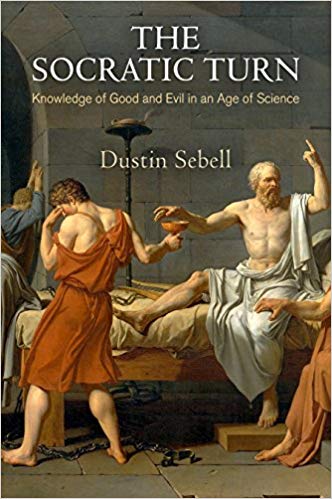
The Socratic Turn: Knowledge of Good and Evil in an Age of Science
By Dr. Dustin Sebell
The Socratic Turn addresses the question of whether we can acquire genuine knowledge of good and evil, right and wrong. Reputedly, Socrates was the first philosopher to make the attempt. But Socrates was a materialistic natural scientist in his youth, and it was only much later in life—after he had rejected materialistic natural science—that he finally turned, around the age of forty, to the examination of ordinary moral and political opinions, or to moral-political philosophy so understood.
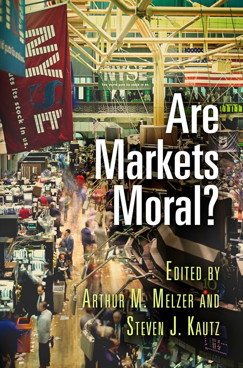
Are Markets Moral?
By Dr. Arthur Melzer and Steven Kautz
Despite the remarkable achievements of free markets—their rapid spread around the world and success at generating economic growth—they tend to elicit anxiety. Creative destruction and destabilizing change provoke feelings of powerlessness in the face of circumstances that portend inevitable catastrophe. Thus, from the beginning, capitalism has been particularly stimulative for the growth of critics and doomsayers. While early analysts such as Karl Marx primarily emphasized an impending economic disaster, in recent years the economic critique of capitalism has receded in favor of moral and environmental concerns.
At the heart of this collection of original essays lies the question: does morality demand that we adopt a primarily supportive or critical stance toward capitalism? Some contributors suggest that the foundational principles of the capitalist system may be at odds with the central requirements of morality, while others wonder whether the practical workings of markets slowly erode moral character or hinder the just distribution of goods. Still others consider whether morality itself does not demand the economic freedom constitutive of the capitalist system. The essays in Are Markets Moral? represent a broad array of disciplines, from economics to philosophy to law, and place particular emphasis on the experiences of non-Western countries where the latest chapters in capitalism's history are now being written.

Judicial Elections in the 21st Century
By Dr. Melinda Gann Hall
Leading authorities present the latest cutting edge research on state judicial elections. Starting with recent transformations in the electoral landscape, including those brought about by U.S. Supreme Court rulings, this volume provides penetrating analyses of partisan, nonpartisan, and retention elections to state supreme courts, intermediate appellate courts, and trial courts. Topics include citizen participation, electoral competition, fundraising and spending, judicial performance evaluations, reform efforts,attack campaigns, and other organized efforts to oust judges. This volume also evaluates the impact of judicial elections on numerous aspects of American politics, including citizens’ perceptions of judicial legitimacy, diversity on the bench, and the consequences of who wins on subsequent court decisions. Many of the chapters offer predictions about how judicial elections might look in the future. Overall, this collection provides a sharp evidence-based portrait of how modern judicial elections actually work in practice and their consequences for state judiciaries and the American people.

Campaigns & Elections
By Dr. Matt Grossmann
Thoroughly and rigorously revised and updated through the 2018 elections by an author team of esteemed teacher-scholars. This text uses a consistent framework to reveal the strategies and choices that face candidates and other practitioners in the American political system.
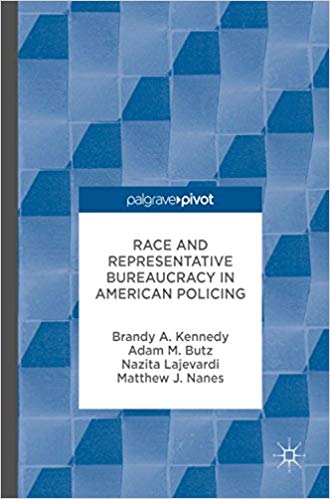
Race and Representative Bureaucracy in American Policing
By Dr. Nazita Lajevardi
This book examines issues of race and policing through the lens of representative bureaucracy theory. According to representative bureaucracy theory, demographic correspondence between government employees and the local population can lead to more favorable outcomes for minority groups. It argues that police forces with higher minority composition will have more positive outcomes across measures such as fewer excessive force complaints and fewer fatal encounters with officers. Additionally, the book asserts that more representative forces will demonstrate responsiveness and accountability by implementing policies such as citizen review boards for excessive force complaints. It does this by first providing a brief overview of issues surrounding race and policing in America, documenting racial representation occurring in local police forces nationwide, and exploring the potential causes and consequences of underrepresentation. It concludes by discussing the implications of our findings and offer potential policy remedies and solutions that local law enforcements can pursue in order to reduce minority underrepresentation and improve policing outcomes.

